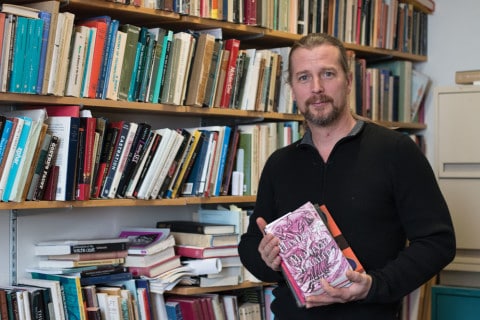With Valentine’s Day just around the corner, University of Saskatchewan students may be spending more time thinking about love rather than focusing on their studies, but one professor in the department of history is finding a way to do both.
The department of history at the U of S offers a variety of courses focusing on themes of love, sex and gender. Valerie Korinek, faculty member in the department, teaches one such course on gender, sex and social justice, from settlement to queer marriage, as part of a suite of new and interesting introductory classes available to U of S students. Further senior-level courses include the history of the body and the construction of gender and masculinity, among others.
history of the body and the construction of gender and masculinity, among others.
While several courses cover topical issues of gender and sexuality throughout the ages, Frank Klaassen, associate professor and undergraduate director in the department of history, teaches one of history’s most passionate and romantic true love stories: Heloise and Abelard.
“We have a set of love letters between these two people from the 12th century, who were two of the most significant intellectuals from their day, so it’s kind of perfect for a senior seminar. We’ve got a pack of geeks in the class reading the two arch-geeks from the 12th century writing love letters to each other,” Klaassen said.
It is more than just the writing that engages readers and encourages further research. As Klaassen points out, the intense degree of passion between these two historical figures makes it an especially compelling story for further study.
According to Klaassen, while the story speaks to its readers from over 900 years ago, students within all degree programs and backgrounds can still learn something from the letters of Heloise and Abelard.
The documents themselves have an interesting history since there has been a great deal of speculation on who actually wrote, and later edited, the letters; Klaassen suspects it was the doing of Heloise.
“We have this let down with historians where we have this period of time when they assumed Abelard must have wrote them because he was the man … It allows people in history courses to reflect on the complexities of historical sources and look at this really cool story.”
The love affair between the 12th century philosopher and theologian and his student Heloise is a story of a passionate relationship that scandalized the community in which they lived. The details of their physical and spiritual intimacy, involving pregnancy, castration and respective retirements to a monastery and a convent to preserve their individual lives, can also be read as a cautionary tale for our time, according to Klaassen.
“For me, this is a terrific way of accessing the worldview and thinking of the people in the 12th century through this incredibly rich document,” Klaassen said. “It’s a compelling story that tells us all kinds of things about sex, violence and marriage, and what intellectuals were doing [as well as] the beginnings of modern universities in the 12th century, all revolving around this torrid love story.”
Klaassen points out that Heloise especially is a character with whom his students generally relate to, as she embodies many characteristics shared by the contemporary feminist, gender inclusive.
Furthermore, Heloise was especially smart and outspoken, according to Klaassen. She explicitly expressed her preference to be considered a whore rather than Abelard’s wife.
“It is an incredibly radical thing to say. It’s a critique of marriage, it’s a critique of women’s place in marriage and how women were used in marriage.”
While Klaassen is not currently teaching the course for the 2016 winter term, he alludes to its return in the future, claiming its relevance to all students studying — or simply interested in — the humanities.
“There are certain things that human beings are not very good at regulating: sex, passion and love are some of those things that mess with us totally. In good ways and bad ways. It’s just the nature of human life. These are really incredibly powerful things … That’s what great literature is about … If we’re here to understand and think about what it means to be human, then the more openly and more candidly we can discuss that, the better off we all are, or at least the better we understand humanity.”
—
Photo: Caitlin Taylor / Photo Editor
Leave a Reply